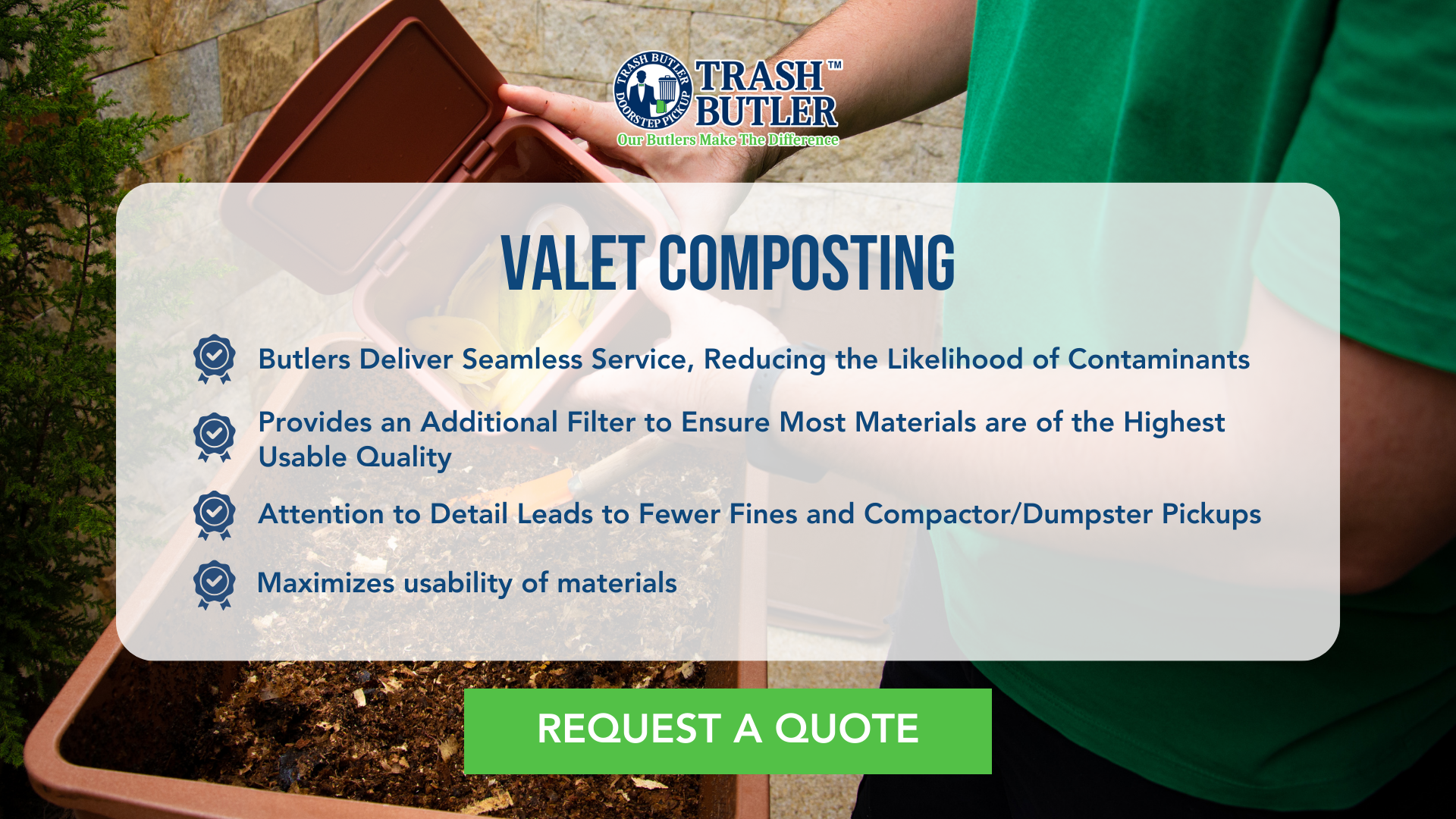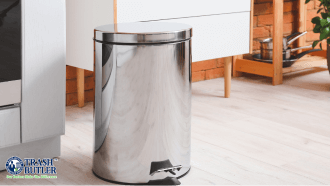In San Diego, a city that values sustainability, apartment complexes are embracing composting as a way to be more eco-friendly. Composting turns organic waste, like food scraps and yard debris, into valuable soil, reducing landfill waste and enhancing the environment. Trash Butler, a company specializing in doorstep trash collection for apartment living, is helping these communities start and maintain composting programs. This approach not only makes composting easy and convenient for residents but also supports San Diego’s green initiatives. By focusing on the benefits of composting, Trash Butler is leading efforts to promote sustainable living practices in multi-family communities, contributing to a healthier, greener future.

Composting is a powerful way for multi-family communities in San Diego to reduce their environmental impact while also reaping numerous benefits. Here are some key advantages of implementing composting programs:
One of the most significant benefits of composting is the diversion of organic waste from landfills. Instead of adding to the already overflowing landfills, composting allows for the organic materials to be broken down and repurposed as nutrient-rich soil.
By composting organic waste, multi-family communities can significantly reduce their carbon footprint. Composting helps to lower greenhouse gas emissions that are typically released when organic materials break down in landfills.
The compost produced from kitchen scraps and yard waste is a valuable resource for enriching soil. When added to gardens or landscapes, compost improves soil structure, retains moisture, and provides essential nutrients for plants to thrive.
Implementing a composting program can lead to cost savings for multi-family communities. By reducing the volume of waste sent to landfills, communities can potentially lower their waste management costs and even generate savings by using the compost produced on-site.
Composting programs can also foster a sense of community and environmental responsibility among residents. Encouraging residents to participate in composting initiatives can promote a shared commitment to sustainability and create a more environmentally conscious living environment.
With increasing focus on environmental regulations and sustainability initiatives, implementing composting programs can help multi-family communities stay compliant with local waste management guidelines and demonstrate their dedication to sustainability practices.
When it comes to composting in multi-family communities in San Diego, it’s essential to understand the different methods available. Here are some common composting techniques that can be implemented to suit the needs of your community:
Traditional composting involves creating a pile or bin where organic waste materials such as food scraps, yard trimmings, and paper products are mixed together and left to decompose naturally. This method requires occasional turning or mixing of the compost pile to ensure proper aeration and decomposition.
Vermicomposting utilizes worms, typically red wigglers, to break down organic waste materials. Worm bins are set up with bedding materials like shredded paper or cardboard, and the worms convert the food scraps into nutrient-rich compost. This method is ideal for smaller spaces and can be done indoors or outdoors.
Bokashi composting is a fermentation process that involves using a specialized mixture of microorganisms to break down organic waste. This method works well for composting meat, dairy, and other food scraps that may not be suitable for traditional composting. Bokashi composting can be done in a sealed container, making it odor-free and suitable for apartments or shared living spaces.
Composting tumblers are rotating containers that accelerate the composting process by providing aeration and mixing. These bins are convenient for compact spaces and can help speed up the decomposition of organic waste, producing compost more quickly than traditional methods.
Composting in multi-family communities in San Diego can be a sustainable and rewarding initiative, but getting started may seem daunting at first. Here are some practical steps to help your building kickstart its composting journey:
Begin by understanding your building’s waste generation and composition. Identify the amount of organic waste produced and the potential for diverting it through composting. This step will provide insight into the feasibility and scale of your composting program.
Engage and educate residents about the benefits of composting and how they can participate. Provide clear guidelines on what can and cannot be composted, along with instructions on proper sorting and disposal methods. Encourage active involvement and create a sense of community ownership of the composting initiative.
Designate convenient and accessible collection points for organic waste within your building. Consider implementing separate bins for compostables to avoid contamination. Ensure that these collection points are clearly labeled and well-maintained to encourage participation and compliance.
Regularly monitor the progress of your composting program and gather feedback from residents to identify areas for improvement. Implement changes as needed to optimize the efficiency and effectiveness of your composting efforts. Celebrate milestones and achievements to motivate continued participation and enhance the sustainability of your building.

Introducing composting programs in San Diego’s multi-family communities offers a meaningful way to protect the environment and unite the community around sustainability. Composting reduces landfill waste and cuts greenhouse gas emissions, highlighting the residents’ role in fostering a healthier planet. Trash Butler™, known for its valet trash services, is now helping these communities start composting, leveraging their vast experience to promote greener living across San Diego.
This effort not only aids the environment but also builds community spirit, as residents work together towards a common goal of sustainability. The Trash Butler team is ready to guide communities through setting up effective composting programs, aiming to make San Diego a leading example of eco-conscious living. Choosing Trash Butler means joining hands in a commitment to a sustainable future, benefiting both the environment and the community.
Plants that have been treated with pesticides or herbicides should not be composted. These chemicals can survive the composting process and harm the future plants that will be grown using the compost.
Materials that should be avoided in compost piles include meats, dairy products, fats, oils, diseased plants, any plants treated with chemicals, and pet wastes due to health hazards and the potential to attract pests.
Yes, composting can significantly reduce the volume of waste sent to landfills, which in turn can lower waste disposal costs for the community.
For optimal results, compost piles should be turned or mixed every 4-6 weeks. This helps aerate the pile and speed up the composting process.
Yes, composting in a multi-family community often involves larger-scale operations and requires more structured management, including designated collection areas and more frequent maintenance.
Composting reduces waste sent to landfills, lowers greenhouse gas emissions, and produces nutrient-rich soil that can be used for landscaping within the community, contributing to overall sustainability goals.
In San Diego, communities interested in starting a composting program may find grants or incentives through local government initiatives or environmental organizations dedicated to waste reduction and sustainability. It’s recommended to check with the City of San Diego’s Environmental Services Department or similar agencies for current opportunities.

Why Valet Trash Services Are Essential For Orlando Apartments
Discover why valet trash for apartments in Orlando is essential. Enhance resident satisfaction and property value with top-notch valet trash…

Why Valet Trash Services Are Essential For Orlando Apartments
Discover why valet trash for apartments in Orlando is essential. Enhance resident satisfaction and property value with top-notch valet trash…

Everything Property Managers Need To Know About Doorstep Trash Pickup
Essential guide for property managers on doorstep trash pickup for apartments. Improve tenant satisfaction and streamline operations with…